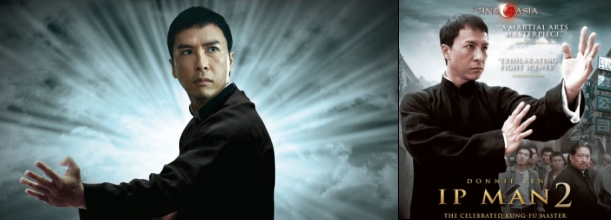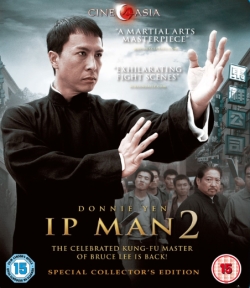Interview with kung-fu legend… Donnie Yen!

Martial artist and Hong Kong action star Donnie Yen’s role as an assassin fighting Jet Li in Hero featured the most anticipated fight scene in 2002. He worked behind the camera with Guillermo del Toro for Blade 2 (in which he also appeared as the mute vampire, Snowman). In the sparky Ip Man 2, Donnie Yen leads as the sifu (teacher) who stood up to the Japanese invasion and famously taught Bruce Lee Wing Chun martial arts…
We were pretty thrilled to get a chance to ask Donnie Yen about filming, injuries, wirework and more. Thank you, Donnie!
Why do you think they couldn’t put everything about Ip Man’s life in one movie?
Well, maybe you could, but it would be a really long movie! I think Ip Man lived through a particularly dramatic period in history, with the Japanese invasion, the development of Hong Kong as a British colony, his being the teacher of someone as important as Bruce Lee… We may do ‘Ip Man 3’, but it won’t be for a while.
You have collaborated so much with director Wilson Yip that you must be like brothers by now! What keeps you working together?
We just have a very good communication, we really understand each other’s way of thinking. Usually, he has been directing, I’ve been action directing, and we just support each other very well. Sometimes when you are the choreographer, you might have differences with the director over the style of the action, but that’s never happened with Wilson. I trust him and he trusts me.
How does Wing Chun differ from the styles you normally portray in movies? What kind of research/training did you do for the movie?
Wing Chun is a style that works at very close range. In my earlier movies, I guess I was known for my kicking, but Wing Chun kicks are also very close range, so it’s a very different style for me. I trained with several different sifu (teachers) for the film, including Ip Man’s son, Ip Chun. I watched all the footage I could find on Wing Chun, read a lot of books. It’s a popular and relatively modern style, so there’s a lot of information out there.
How do you feel about both doing and watching wirework in movies?
I think it’s a useful tool for a choreographer, providing you know how to use it. For example, if we’d had Ip Man flying around like someone from ‘Crouching Tiger, Hidden Dragon’, that would have been wrong for this movie, though that kind of wirework would be fine for a swordplay film. If you use it well, wirework can really enhance the action, and audiences might not even be aware of it.
What was the toughest thing for you personally about working on Ip Man and Ip Man 2?
I had to diet down to make my body type more like that of Ip Man. I actually find it quie easy to lose weight, but it’s tough to diet and do a lot of action, and keep your energy level up.
Ip Man is a legend – the great grandmaster of Wing Chun, and Bruce Lee’s legendary teacher. Do you feel kinship with Ip Man after doing the movie? Is there anything you would like to have learned from him yourself?
It would have been an honour to learn Wing Chun from him. I got a lot of insights into his character from talking to his son and to the other sifu who actually trained with him. He was a really amazing character, and I do absolutely feel a bond with him. After two films of playing that same person, a real person, every day, I probably have a closer bond with Ip Man than any other role I’ve played.
Have you got any other projects on the go?
Yes! I have three films, All’s Well Ends Well 2011, The Lost Bladesman and Wu Xia wrapped, and I’m shooting Havoc In Heaven, a new version of the Monkey King, now.
Ip Man 2 arrives on DVD and Blu-ray (including World Exclusive Special Features) on 7th March 2011, courtesy of Cine Asia. For more information on Cine Asia’s titles, visit www.cine-asia.co.uk






Recent Comments